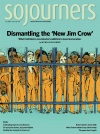 Michelle Alexander, author ofThe New Jim Crow,writes in the July issue of Sojourners Magazinethat when it comes to the U.S. system of mass incarceration, “We face a profound moral and spiritual crisis, not merely a social, political, or economic one.” Alexander references the newly released book by Prison Studies Project Director Dr. Kaia Stern regarding our moral and spiritual obligation to dismantle the U.S. penal system, i.e. the New Jim Crow.
Michelle Alexander, author ofThe New Jim Crow,writes in the July issue of Sojourners Magazinethat when it comes to the U.S. system of mass incarceration, “We face a profound moral and spiritual crisis, not merely a social, political, or economic one.” Alexander references the newly released book by Prison Studies Project Director Dr. Kaia Stern regarding our moral and spiritual obligation to dismantle the U.S. penal system, i.e. the New Jim Crow.
As excerpted from the article:
“The system of mass incarceration is rotten to its core. As Kaia Stern eloquently explains in her book Voices from American Prisons, the quintupling of our prison populations in a few short decades and the relegation of tens of millions of people to a permanent second-class status is a reflection of the fact that we in the United States are captive to a ‘spirit of punishment.’ She writes, ‘There is no more pressing human rights issue, no more urgent spiritual crossroads or threat to democracy, than the current penal crisis.'”
“The ultimate question for us,as people of faith and conscience,” Alexander continues, “is whether we are willing to rise to the challenge this moment in our history presents…It will require great courage, and some real sacrifice, to stand up for, and to stand with, the ‘least of these’–the criminals, the felons, the despised, and the ‘illegals’–and to insist publicly on their humanity, dignity and value in the eyes of God. It will not be easy for people to learn to care for the drug addict and the drug dealer, or to see that the victim of a horrible crime as well as the perpetuator are both children of God and worthy of our profound care and concern. People may be reluctant to see that the woman who crossed the border illegally in the hopes of a better life deserves our sincere compassion, as does the young man who sold some weed to help the mother of his child pay the rent. Cultivating such a shift in consciousness will require the birth of a movement unlike anything this nation has ever seen–one that is rooted in the awareness of the fundamental dignity and basic human rights of each and every one of us, no matter who we are, where we came from, or what we’ve done.”
Alexander concludes by outlining three steps that should be taken for building a transformative movement for justice.
1. Awakening: “It is impossible to build a transformative movement for justice if people remain in the dark about the magnitude of the crisis at hand, its origins, and its racial, economic, and political dimensions.”
2. Building an Underground Railroad: …”for people trying to make a break for true freedom in the era of mass incarceration and who desperately need help finding shelter, food, work, and reunification with their families.”
3. Working for Abolition: Involves four parts, (1) Ending the drug war, (2) Ending all forms of unnecessary yet legal discrimination against people with criminal records, (3) Abandoning a purely punitive approach to dealing with violence, and (4) Dismantling the school-to-prison pipeline by ending zero-tolerance school discipline policies.
You can read the full article by purchasing a short- or long-term subscription to Sojourners, or look for the issue in your local bookstore or public library.